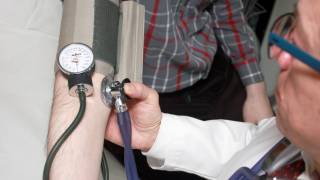Flu Shots Are Good For The Heart

In the first study of its type, researchers found people with heart failure who get a flu vaccination realized a 50 percent decrease in the risk of death during flu season.
Additionally, the risk of death during the following year decreased by 20 percent.
And, a getting a flu shot was also associated with a 22 percent reduction in the risk of being hospitalized for cardiovascular problems.
The Centers for Disease Control and Prevention (CDC) recommends that everyone age 6 months and older get a flu shot each year and encourages people with heart disease to stay current on immunizations.
The CDC says people with heart failure are susceptible to influenza-related complications, including the exacerbation of acute heart failure and secondary infections, such as pneumonia.
Some vaccine-preventable diseases, like the flu, can increase the risk of another heart attack, says the CDC.
Hidekatsu Fukuta, MD, a cardiologist from Japan and the study's lead author, reported the meta-analysis findings at the annual meeting of the American College of Cardiology 67th Annual Scientific Session.
"It is well known that influenza infection is associated with increased risk for mortality in heart failure patients," said Dr. Fukuta.
"Given the high mortality rate and the relatively low influenza vaccination rates in heart failure patients worldwide, our study supports a wider use of influenza vaccination in heart failure patients."
These researchers analyzed six studies conducted in the U.S., Europe and Asia that together included data for more than 78,000 patients with heart failure. The researchers found no randomized control trials designed specifically to investigate influenza vaccination in patients with heart failure.
In these studies, the proportion of heart failure patients receiving the flu vaccine ranged from 26 to 86 percent, reflecting wide variability in vaccination rates among these patients.
Researchers suggested this variability may be due to limited guideline recommendations for influenza vaccination in heart failure patients.
The findings suggest influenza vaccination is beneficial for patients with heart failure, although researchers cautioned that while observational studies can show associations, they do not necessarily prove cause and effect.
"Randomized controlled studies should be planned to confirm our observed potential survival benefit of influenza vaccination in these patients," Fukuta said.
The American College of Cardiology is a 52,000-member medical society with a mission to transform cardiovascular care and to improve heart health.
Most pharmacies offer several FDA approved flu vaccines.
The CDC Vaccine Price List provides the private sector prices for general information.
Flu vaccine discounts can be found here.
Vaccines, like any medicine, can have side effects, says the CDC. You are encouraged to report negative side effects of vaccines to the FDA or CDC.
Our Trust Standards: Medical Advisory Committee
















